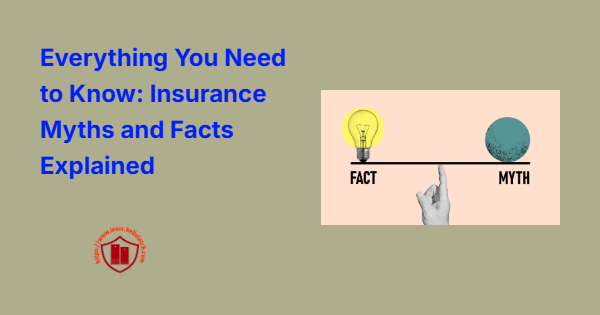
Insurance is one of the most important aspects of protecting your assets and ensuring financial stability. However, navigating through the world of insurance can be complicated, especially with so many myths and misconceptions surrounding it. These myths can lead to poor decisions that could end up costing you more than necessary. In this article, we’ll break down some of the most common insurance myths and provide the facts you need to make informed decisions about your coverage.
Myth 1: “The Cheapest Insurance Is Always the Best Deal”
One of the biggest myths in the insurance industry is that the cheapest policy is always the best option. While it may seem like a bargain to opt for a low-cost plan, these policies often come with limited coverage, higher deductibles, or less-than-ideal customer service. In many cases, a low premium could mean you’re not fully covered when disaster strikes, leaving you with unexpected out-of-pocket expenses. The best deal is a policy that balances cost with comprehensive coverage to fit your needs.
Fact: The cheapest insurance may not be the most cost-effective if it doesn’t provide the coverage you need when it counts.
Myth 2: “You Don’t Need Life Insurance if You’re Young and Healthy”
Many young people believe they don’t need life insurance, assuming that it’s only for those with dependents or older individuals. While it’s true that life insurance becomes more crucial as you age or take on family responsibilities, purchasing it when you’re young and healthy can be a smart financial move. Premiums are generally much lower for younger people, and buying life insurance early locks in lower rates for the future.
Fact: Getting life insurance early in life can save you money over time and provides financial security if something unexpected happens.
Myth 3: “Homeowners Insurance Covers Everything”
Homeowners insurance is essential for protecting your home and belongings, but it doesn’t cover every type of damage. For example, most standard policies do not cover natural disasters like floods or earthquakes. If you live in an area prone to these events, you may need to purchase additional coverage such as flood or earthquake insurance. Failing to do so could leave you vulnerable in the event of a disaster.
Fact: Homeowners insurance has limitations. Always check the fine print and consider adding supplemental coverage for natural disasters or other specific risks.
Myth 4: “Car Insurance Covers Everything in an Accident”
Many drivers assume their car insurance will cover all damages in the event of an accident. However, this is not always the case. Standard auto insurance policies typically cover damages to your own vehicle, but they might not cover the damage to another vehicle or property unless you have liability coverage. Furthermore, if you’re at fault in an accident, you may still be responsible for the damage unless you have comprehensive coverage or collision insurance.
Fact: Car insurance doesn’t always cover everything. Be sure to review your policy and consider adding additional coverage to protect yourself fully.
Myth 5: “Health Insurance Covers All Medical Costs”
While health insurance provides essential coverage for medical expenses, it doesn’t cover everything. Many policies have exclusions, and you may still face copayments, deductibles, and out-of-pocket costs for services like dental and vision care. Additionally, some treatments or medications may not be covered, especially if they are considered elective or outside of your network. It’s important to understand your plan’s coverage limitations and explore options like supplemental health insurance if needed.
Fact: Health insurance doesn’t cover all medical expenses. Always check what your plan includes and consider extra coverage for specific needs.
Myth 6: “Insurance Companies Always Deny Claims”
There’s a misconception that insurance companies are always looking for ways to deny claims, but this is simply not true. Most insurance companies have a vested interest in maintaining good relationships with their customers and paying valid claims. While there may be instances where a claim is denied, this is typically due to the terms of the policy, missing documentation, or fraudulent claims.
Fact: Insurance companies aim to honor valid claims. If your claim is denied, it’s essential to review the policy and understand why it was rejected before assuming the worst.
Myth 7: “Once You Buy Insurance, You’re Done”
Many people assume that once they’ve purchased an insurance policy, they don’t need to think about it again. However, your life circumstances can change, and your insurance needs may evolve over time. Major life events like getting married, having children, buying a home, or changing jobs can all impact the type and amount of coverage you need. Regularly reviewing your policies ensures that they still meet your needs and that you’re not paying for unnecessary coverage.
Fact: Insurance is not a one-time purchase. Regularly reviewing your policies ensures they remain aligned with your life changes.
Conclusion
Insurance is crucial for safeguarding your financial future, but it’s important to separate myths from facts when selecting the right coverage for your needs. By understanding the truth behind these common misconceptions, you can make informed decisions that provide the protection you need without overpaying. Always take the time to review your options, ask questions, and work with a reputable insurance provider to ensure you’re getting the best coverage for your specific situation.
In the end, your goal should be to secure the right protection that fits your lifestyle and budget. By staying informed and avoiding these insurance myths, you’ll be in a better position to make smarter, more cost-effective decisions when it comes to your insurance needs in 2025.

Leave a Reply